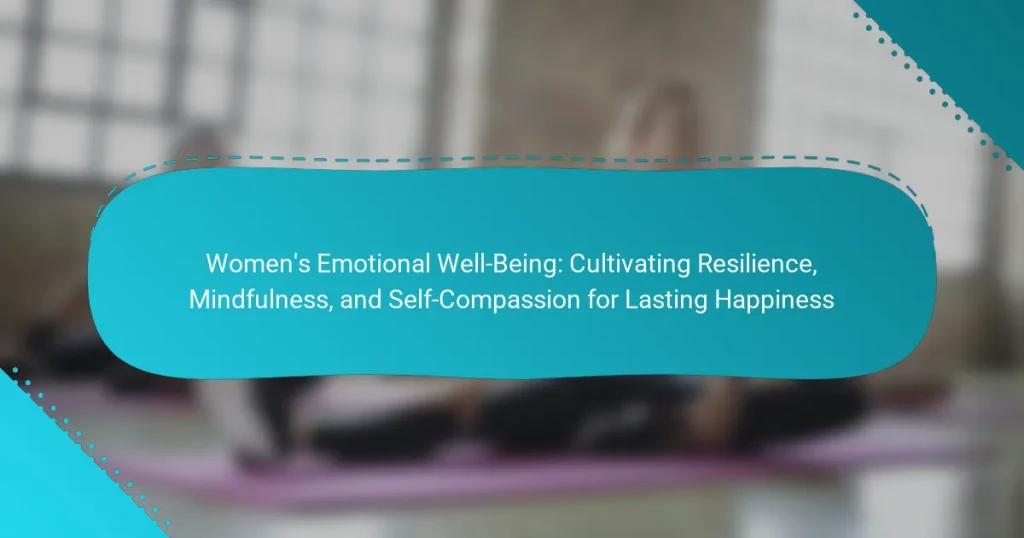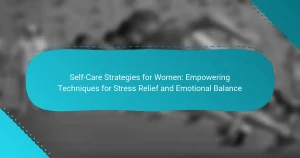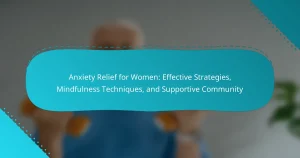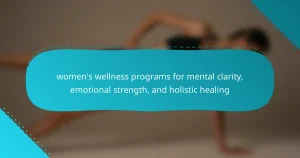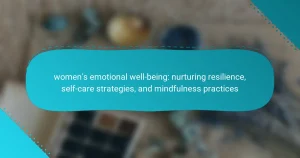Achieving lasting happiness is a priority for many women, yet unique challenges often hinder emotional well-being. This article explores resilience-building strategies, the benefits of mindfulness, and the importance of self-compassion. It highlights how these practices improve emotional regulation and life satisfaction. Additionally, it discusses effective self-care activities and the role of supportive social networks in enhancing mental health.
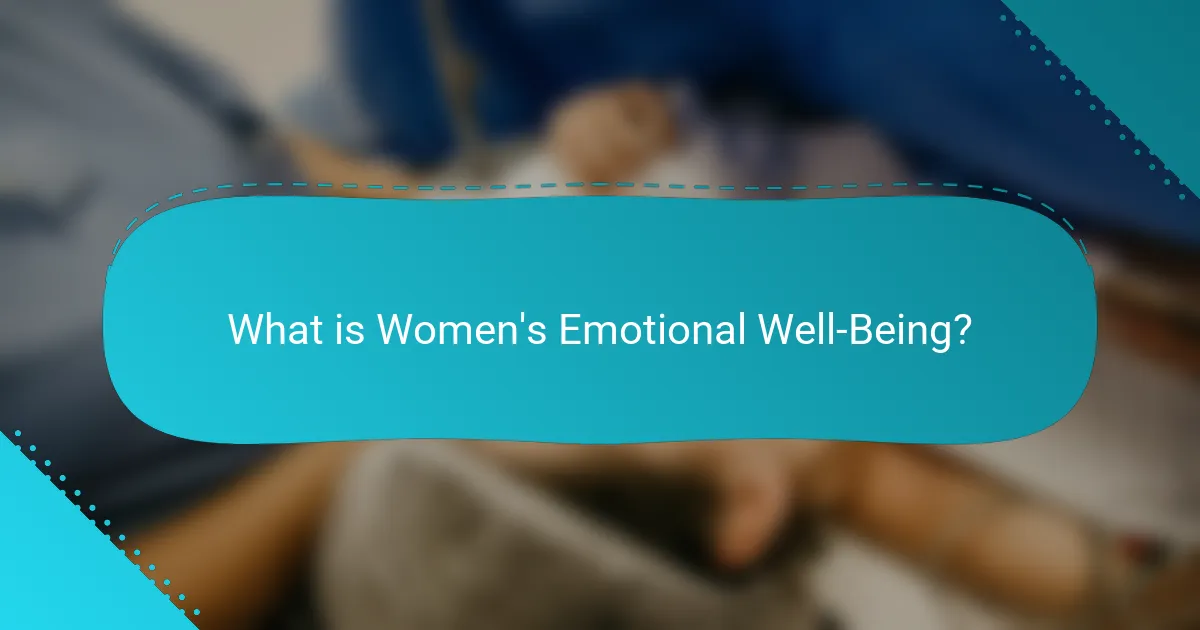
What is Women’s Emotional Well-Being?
Women’s emotional well-being refers to the state of mental health and emotional resilience that women cultivate to achieve lasting happiness. It encompasses practices like mindfulness, self-compassion, and resilience-building strategies. These attributes contribute to improved emotional regulation, stress management, and overall life satisfaction. Research indicates that women who engage in mindfulness practices report higher levels of emotional well-being and lower levels of anxiety. Additionally, self-compassion fosters a positive self-image, enabling women to navigate challenges more effectively. Prioritizing emotional well-being empowers women to lead fulfilling lives, enhancing both personal and professional relationships.
Why is Emotional Well-Being Important for Women?
Emotional well-being is crucial for women as it fosters resilience, mindfulness, and self-compassion, leading to lasting happiness. Women often face unique stressors, such as societal expectations and caregiving roles, which can impact their mental health. Research indicates that women are more likely to experience anxiety and depression, making emotional well-being essential for overall health. Prioritizing emotional health enhances relationships, boosts self-esteem, and encourages personal growth. Cultivating practices like mindfulness can significantly improve emotional resilience, enabling women to navigate life’s challenges more effectively.
What Are the Key Components of Emotional Well-Being?
The key components of women’s emotional well-being include resilience, mindfulness, and self-compassion. Resilience helps women cope with challenges, fostering a positive mindset. Mindfulness promotes awareness and presence, reducing stress and enhancing emotional regulation. Self-compassion encourages kindness towards oneself, leading to greater happiness and emotional stability. Together, these components cultivate a holistic approach to lasting emotional health.
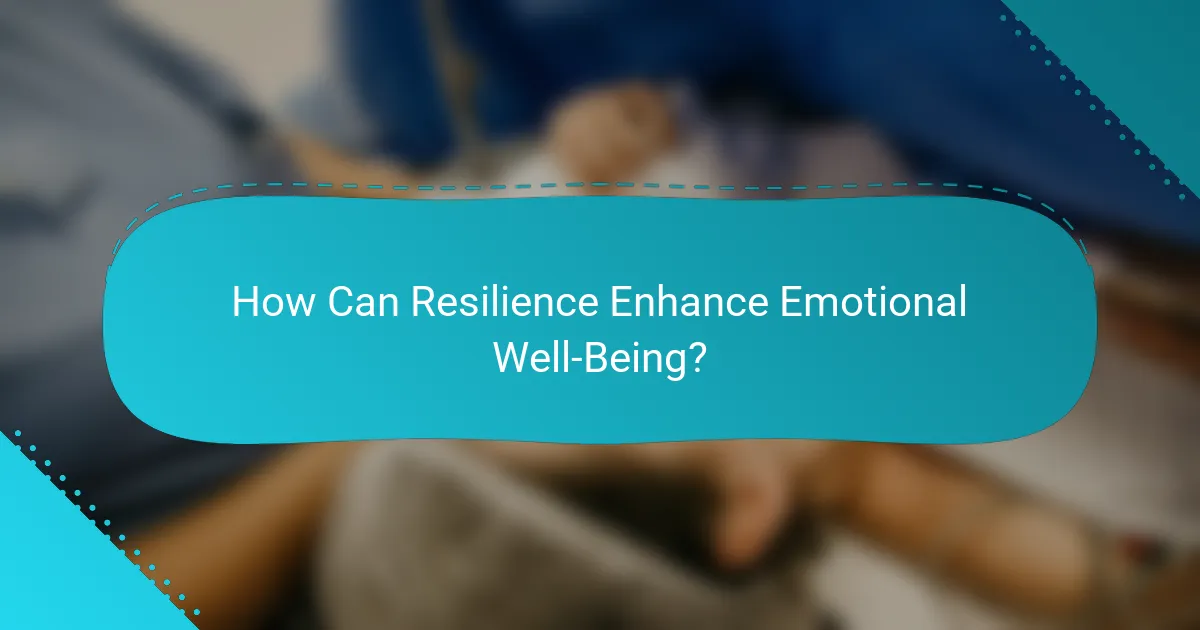
How Can Resilience Enhance Emotional Well-Being?
Resilience significantly enhances emotional well-being by fostering coping skills, promoting positive thinking, and reducing stress. Women who cultivate resilience experience improved mental health and greater life satisfaction. Research indicates that resilient individuals are better equipped to handle adversity, leading to lower rates of anxiety and depression. Practicing mindfulness and self-compassion further strengthens resilience, creating a robust foundation for lasting happiness.
What Techniques Build Resilience in Women?
Practicing mindfulness, fostering self-compassion, and building supportive networks are key techniques that build resilience in women. Mindfulness enhances emotional regulation, while self-compassion promotes a positive self-view. Supportive relationships provide essential encouragement during challenges. These techniques collectively contribute to improved emotional well-being and lasting happiness.
How Do Personal Experiences Shape Resilience?
Personal experiences significantly shape resilience by fostering emotional growth and adaptability. Women often draw on past challenges to cultivate strength and develop coping strategies. This process enhances emotional well-being, enabling them to navigate future adversities with greater confidence. Research indicates that mindfulness practices, rooted in personal reflection, further support resilience by promoting self-awareness and emotional regulation. As a result, women can transform their experiences into powerful tools for lasting happiness.
What Role Does Supportive Community Play?
Supportive community plays a crucial role in enhancing women’s emotional well-being. It fosters resilience, promotes mindfulness, and nurtures self-compassion, contributing to lasting happiness. Engaging with a supportive network can reduce feelings of isolation and increase emotional regulation. Research indicates that women with strong social connections experience lower stress and improved mental health outcomes. Additionally, sharing experiences within a community encourages personal growth and reinforces positive coping strategies.
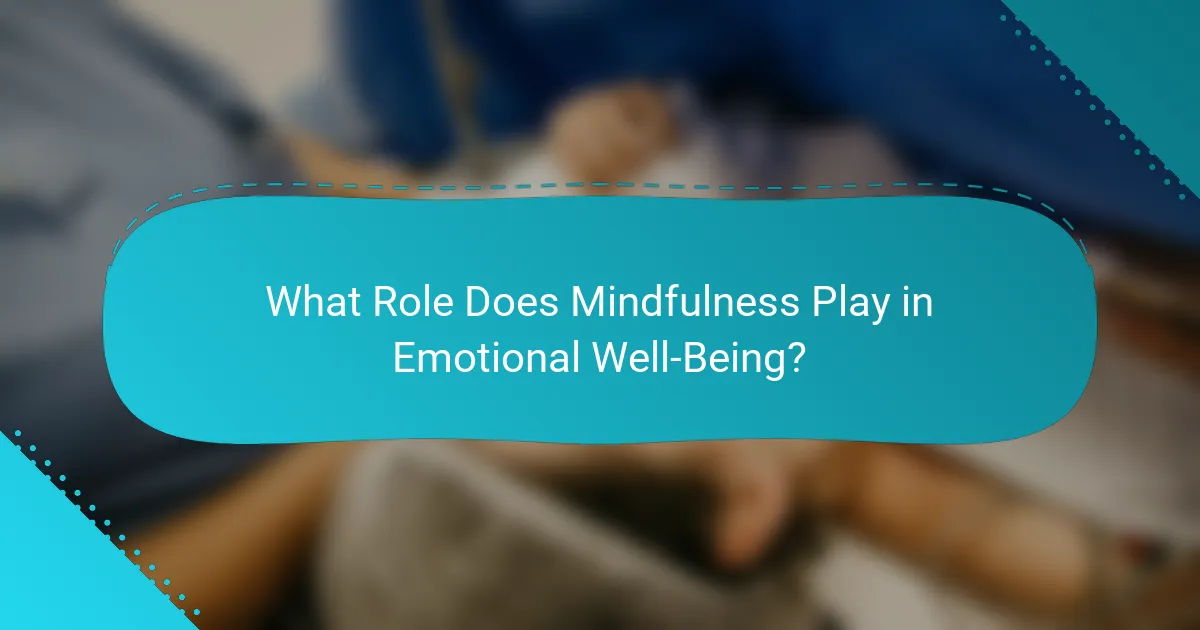
What Role Does Mindfulness Play in Emotional Well-Being?
Mindfulness significantly enhances women’s emotional well-being by fostering resilience and self-compassion. It encourages present-moment awareness, reducing stress and anxiety. Research indicates that regular mindfulness practice can improve emotional regulation and increase overall happiness. Women who engage in mindfulness report greater life satisfaction and stronger coping mechanisms during challenging times.
How Can Mindfulness Practices Be Integrated into Daily Life?
Mindfulness practices can be seamlessly integrated into daily life through simple, intentional actions. Start by setting aside a few minutes each day for mindfulness meditation, focusing on your breath. Incorporate mindful eating by savoring each bite and paying attention to flavors and textures. Engage in mindful walking by noticing your surroundings and the sensations in your body. Establish a routine that includes these practices to cultivate emotional well-being and resilience. As a result, you can enhance self-compassion and foster lasting happiness.
What Are Effective Mindfulness Techniques for Women?
Effective mindfulness techniques for women include meditation, mindful breathing, and body scanning. These practices enhance emotional well-being and build resilience. For instance, meditation can reduce stress levels by promoting relaxation and focus. Mindful breathing helps ground emotions, while body scanning increases awareness of physical sensations, fostering self-compassion. Regular practice can lead to lasting happiness and improved mental health.
How Does Mindfulness Impact Stress and Anxiety?
Mindfulness significantly reduces stress and anxiety by promoting emotional regulation and enhancing self-awareness. Practicing mindfulness allows women to cultivate resilience, leading to improved emotional well-being. Research indicates that mindfulness meditation can decrease anxiety levels by 30% and stress by 25% over eight weeks of consistent practice. This unique attribute of mindfulness fosters a sense of control over thoughts and emotions, contributing to lasting happiness. As a result, integrating mindfulness into daily routines can empower women to manage stress and anxiety more effectively.
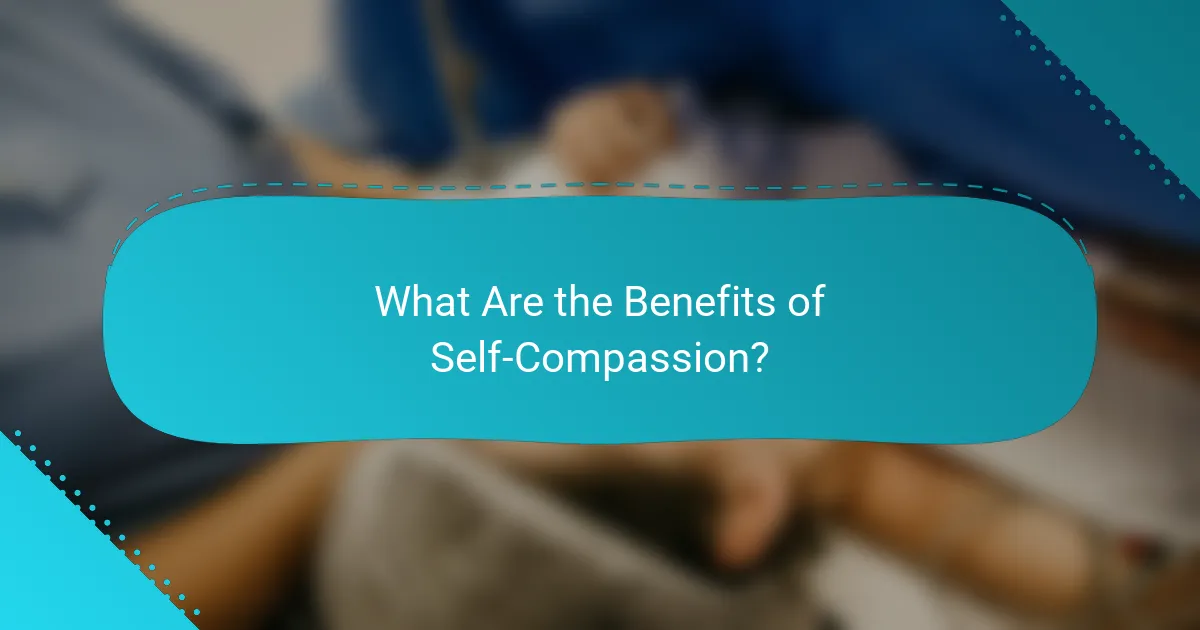
What Are the Benefits of Self-Compassion?
Self-compassion enhances emotional well-being by promoting resilience, mindfulness, and lasting happiness. It fosters a positive self-view, reduces anxiety, and encourages emotional regulation. Research shows that self-compassionate individuals experience lower levels of depression and higher life satisfaction. Practicing self-compassion can lead to greater motivation and personal growth, enabling women to navigate challenges with grace.
How Can Women Cultivate Self-Compassion?
Women can cultivate self-compassion by practicing mindfulness, embracing self-kindness, and recognizing shared humanity. Mindfulness helps women become aware of their thoughts and feelings without judgment. Self-kindness encourages treating oneself with care during difficult times. Recognizing shared humanity fosters connection, reminding women that struggles are universal. Engaging in these practices can enhance emotional resilience and overall well-being.
What Are Common Barriers to Self-Compassion?
Common barriers to self-compassion include negative self-talk, fear of vulnerability, and societal expectations. These factors hinder emotional well-being and resilience in women. Negative self-talk reinforces feelings of inadequacy, while fear of vulnerability prevents openness to self-kindness. Societal expectations often promote perfectionism, making it difficult to practice self-compassion. Addressing these barriers is essential for cultivating lasting happiness.
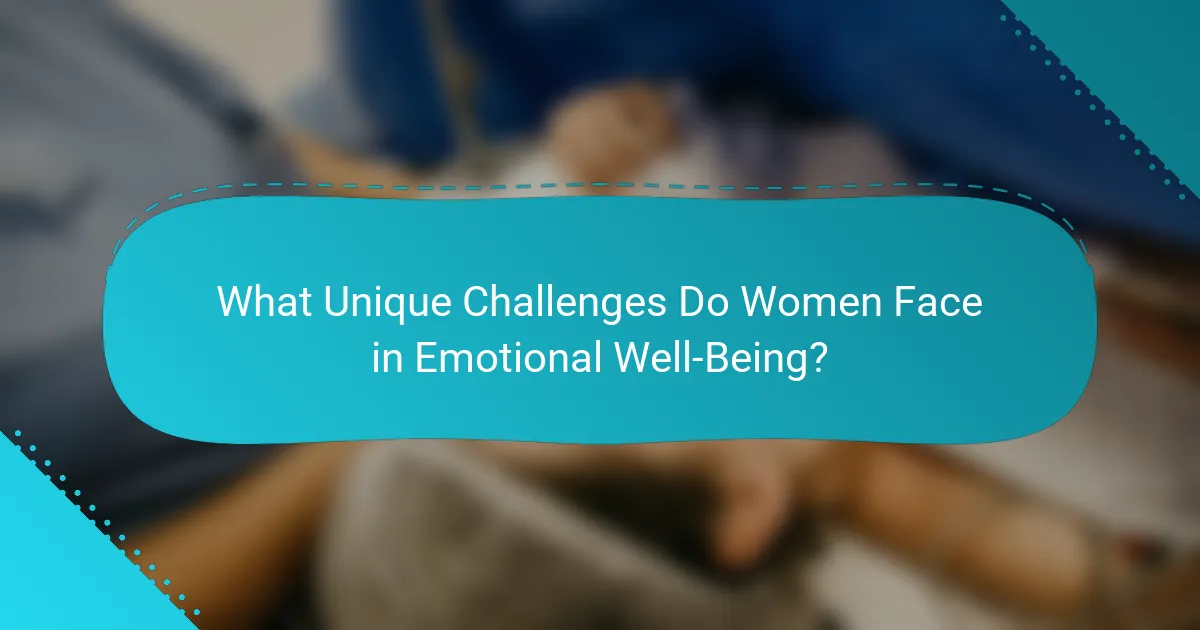
What Unique Challenges Do Women Face in Emotional Well-Being?
Women face unique challenges in emotional well-being, including societal expectations, gender-based stressors, and a lack of support. These factors can hinder their resilience and mindfulness. Research shows that women often experience higher rates of anxiety and depression, partly due to these pressures. Cultivating self-compassion is crucial for women to navigate these challenges and promote lasting happiness. Emphasizing emotional intelligence and community support can further enhance their emotional health.
How Do Societal Expectations Affect Women’s Mental Health?
Societal expectations significantly impact women’s mental health by imposing standards that can lead to stress and anxiety. These pressures often manifest as feelings of inadequacy and self-doubt. Studies show that women are more likely to experience mental health issues due to societal norms that dictate their roles and behaviors. For instance, the expectation to balance career and family can create overwhelming stress, affecting emotional well-being. Cultivating resilience, mindfulness, and self-compassion can help women navigate these societal pressures effectively.
What Are the Impacts of Work-Life Balance on Emotional Well-Being?
Work-life balance significantly enhances women’s emotional well-being by reducing stress and promoting resilience. A balanced lifestyle fosters mindfulness, allowing women to engage in self-care practices that cultivate self-compassion. Research indicates that women with effective work-life balance report higher levels of happiness and lower anxiety levels. Prioritizing personal time leads to improved mental health, enabling women to manage challenges more effectively.
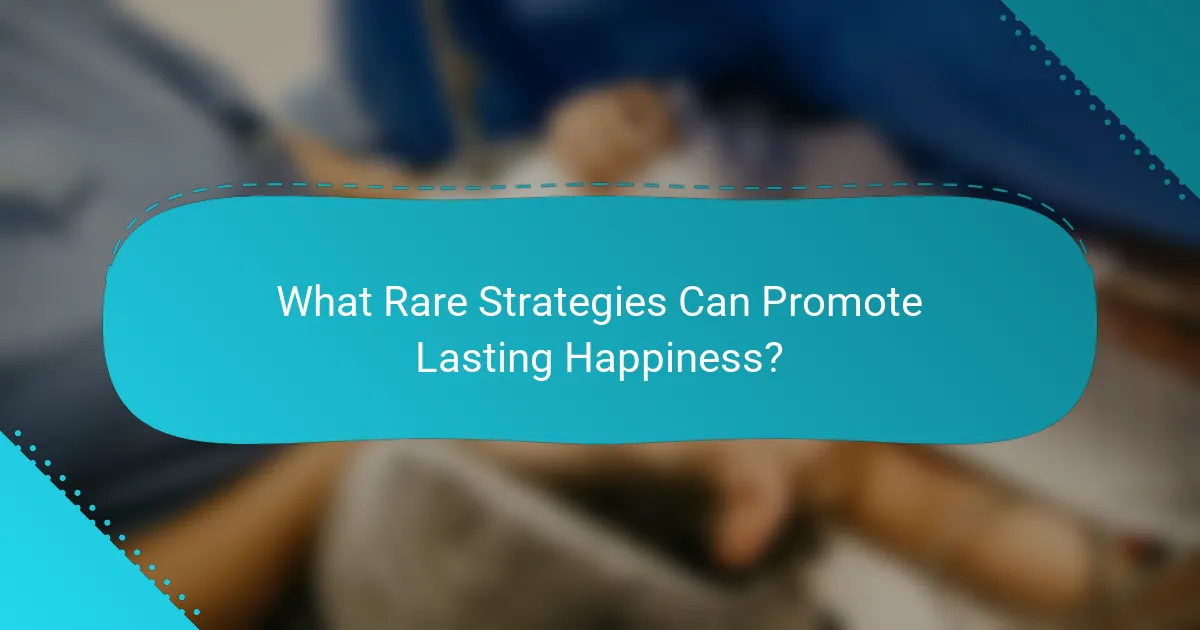
What Rare Strategies Can Promote Lasting Happiness?
Practicing rare strategies like gratitude journaling, engaging in nature therapy, and fostering deep social connections can significantly enhance women’s emotional well-being. These methods cultivate resilience, mindfulness, and self-compassion, leading to lasting happiness. Gratitude journaling encourages reflection, nature therapy reduces stress, and strong social ties provide support. Implementing these strategies can transform emotional health and promote enduring joy.
How Can Creative Expression Contribute to Emotional Well-Being?
Creative expression significantly enhances women’s emotional well-being by fostering resilience, mindfulness, and self-compassion. Engaging in activities like painting, writing, or music allows for emotional release and self-reflection. Research shows that creative outlets can reduce stress levels by up to 75%, promoting a sense of accomplishment and joy. This process cultivates mindfulness, encouraging women to stay present and appreciate their experiences. Ultimately, creative expression serves as a powerful tool for nurturing lasting happiness and emotional health.
What Are Some Forms of Creative Expression?
Creative expression can take many forms, enhancing women’s emotional well-being through resilience, mindfulness, and self-compassion. Common forms include visual arts, writing, music, dance, and theater. Each form allows for personal reflection and emotional release, contributing to lasting happiness. Engaging in these activities fosters a sense of community and connection, essential for cultivating emotional resilience.
What Role Does Nature Play in Enhancing Emotional Well-Being?
Nature plays a crucial role in enhancing emotional well-being. Exposure to natural environments reduces stress and promotes feelings of happiness and tranquility. Studies show that spending time outdoors can lead to increased resilience, mindfulness, and self-compassion, key components for lasting happiness among women. Engaging with nature fosters a sense of connection and belonging, which further supports emotional health.
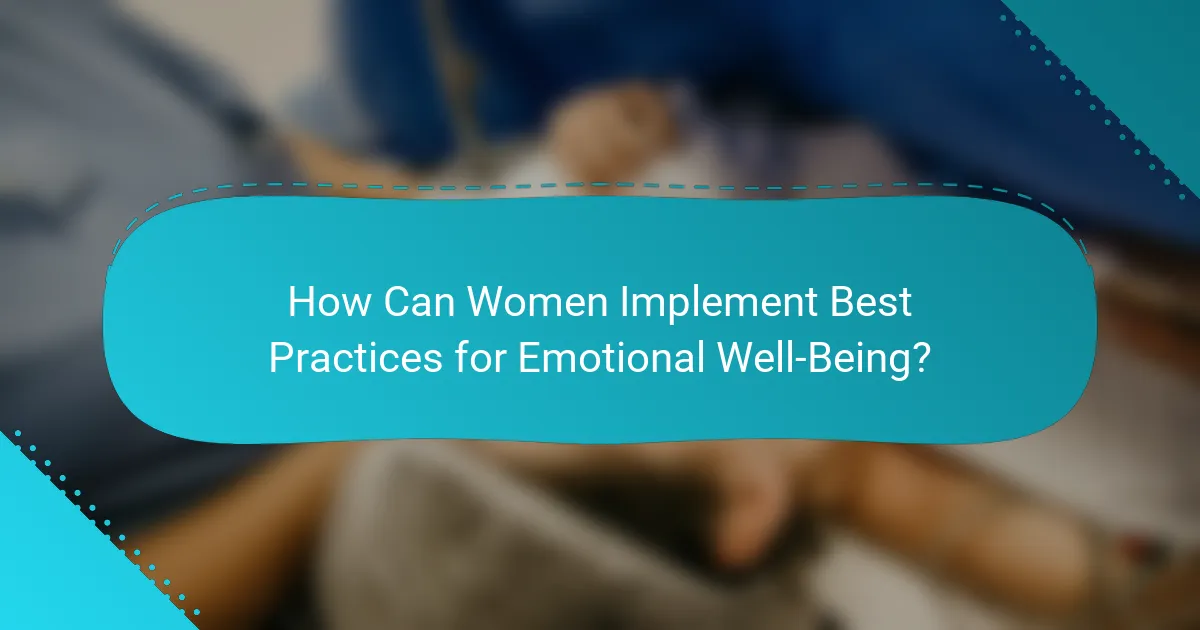
How Can Women Implement Best Practices for Emotional Well-Being?
Women can implement best practices for emotional well-being by cultivating resilience, mindfulness, and self-compassion. These practices enhance emotional regulation and promote lasting happiness.
Resilience allows women to bounce back from challenges, fostering a positive mindset. Mindfulness encourages present-moment awareness, reducing stress and anxiety. Self-compassion nurtures a kind relationship with oneself, leading to improved emotional health.
Engaging in regular self-care activities, such as exercise and hobbies, bolsters these practices. Building supportive social networks further enhances emotional resilience and well-being. Prioritizing mental health is essential for achieving overall happiness.
What Common Mistakes Should Be Avoided?
To enhance women’s emotional well-being, avoid common mistakes that hinder resilience, mindfulness, and self-compassion.
Neglecting self-care leads to burnout and emotional exhaustion. Failing to practice mindfulness can result in increased stress and anxiety. Ignoring negative self-talk diminishes self-compassion and self-acceptance. Overcommitting to responsibilities often causes feelings of overwhelm. Lastly, resisting vulnerability prevents authentic connections and support from others.
What Expert Insights Can Guide Women’s Emotional Wellness Journey?
Expert insights for women’s emotional wellness emphasize resilience, mindfulness, and self-compassion. These elements foster lasting happiness and emotional stability. Research indicates that practicing mindfulness can reduce anxiety by 30%, while self-compassion enhances overall life satisfaction. Resilience training helps women navigate challenges effectively, promoting a positive mindset. Engaging in community support and therapy can further strengthen emotional well-being. These strategies collectively guide women on their emotional wellness journey.
